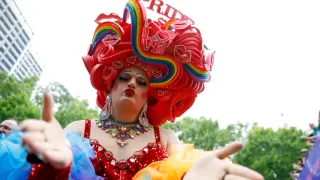
3 hours ago
Federal Appeals Court Upholds Washington State Protections for Transgender Minors
READ TIME: 3 MIN.
A major legal challenge to Washington State’s protections for transgender minors was rejected Friday by a federal appeals court, marking a significant victory for LGBTQ+ rights advocates and transgender youth in the state. The U.S. Court of Appeals for the Ninth Circuit ruled that the plaintiffs—five sets of parents and two organizations opposed to gender-affirming care—could not demonstrate harm from the laws and therefore lacked legal standing to pursue their case .
Washington State has enacted several laws over the past four decades to protect the autonomy and well-being of minors seeking mental and physical health care. Since 1985, minors aged 13 and older in Washington have been allowed to access outpatient mental health and substance use services without parental consent .
In 2023, the state expanded protections, particularly for transgender youth and others who may face abuse or neglect at home. Under these newer statutes, licensed shelters housing unaccompanied minors are not required to notify parents if doing so would place the youth at risk of harm—such as in cases where the minor is seeking gender-affirming care and fears parental rejection .
The lawsuit was filed by a coalition of parents and two national organizations—International Partners for Ethical Care and Advocates Protecting Children. The plaintiffs alleged that the laws violated their parental rights and endangered children by allowing access to care without parental oversight .
However, in a unanimous decision, the three-judge panel concluded that the plaintiffs could not show they had been harmed or were likely to be harmed by the statutes. Judge Milan D. Smith, writing for the court, explained that the alleged injuries were speculative, noting, “There was no evidence that any of the parents’ children were about to run away to a shelter that would refuse to notify the child’s parents” . The court affirmed the district court’s dismissal for lack of Article III standing, stating that hypothetical or abstract fears do not meet the threshold for federal litigation .
LGBTQ+ advocacy groups and healthcare providers have welcomed the decision, emphasizing that these protections are crucial for the safety and health of transgender minors. Many young people, particularly those who are transgender or gender nonconforming, face heightened risks of family rejection, homelessness, and mental health crises .
According to the Gender Justice League, Washington’s legal framework ensures that transgender minors can still access gender-affirming care and shelter services without fear of forced outing or parental retaliation—a contrast to recent Supreme Court decisions upholding bans on gender-affirming care in other states .
“Trans youth still have the right to gender-affirming care here in Washington State. Our state guarantees the right to affirming healthcare, and this decision keeps those protections intact,” a spokesperson for the Gender Justice League stated .
The appeals court’s decision comes at a time when access to gender-affirming care for minors is a deeply contested issue nationwide. In June, the U.S. Supreme Court allowed Tennessee and other states to enforce laws prohibiting puberty blockers and other gender-affirming treatments for transgender minors . Washington’s approach stands in stark contrast, prioritizing the safety and agency of minors, particularly those at risk of abuse or neglect due to their gender identity.
Legal experts note that the Ninth Circuit’s ruling reinforces the principle that states have broad authority to regulate the health and welfare of minors, provided those laws do not cause demonstrable harm to the plaintiffs bringing suit .
As legislative and judicial battles over transgender rights continue across the United States, Washington remains a state where transgender youth can seek care and shelter without fear of involuntary disclosure to unsupportive parents. The Ninth Circuit’s decision may serve as an important precedent for other jurisdictions seeking to balance parental rights with the urgent needs of vulnerable LGBTQ+ minors .
For now, LGBTQ+ advocates in Washington and beyond see the ruling as a reaffirmation of the rights and dignity of transgender youth, and a critical step in ensuring safer, healthier futures for all young people—regardless of gender identity.






